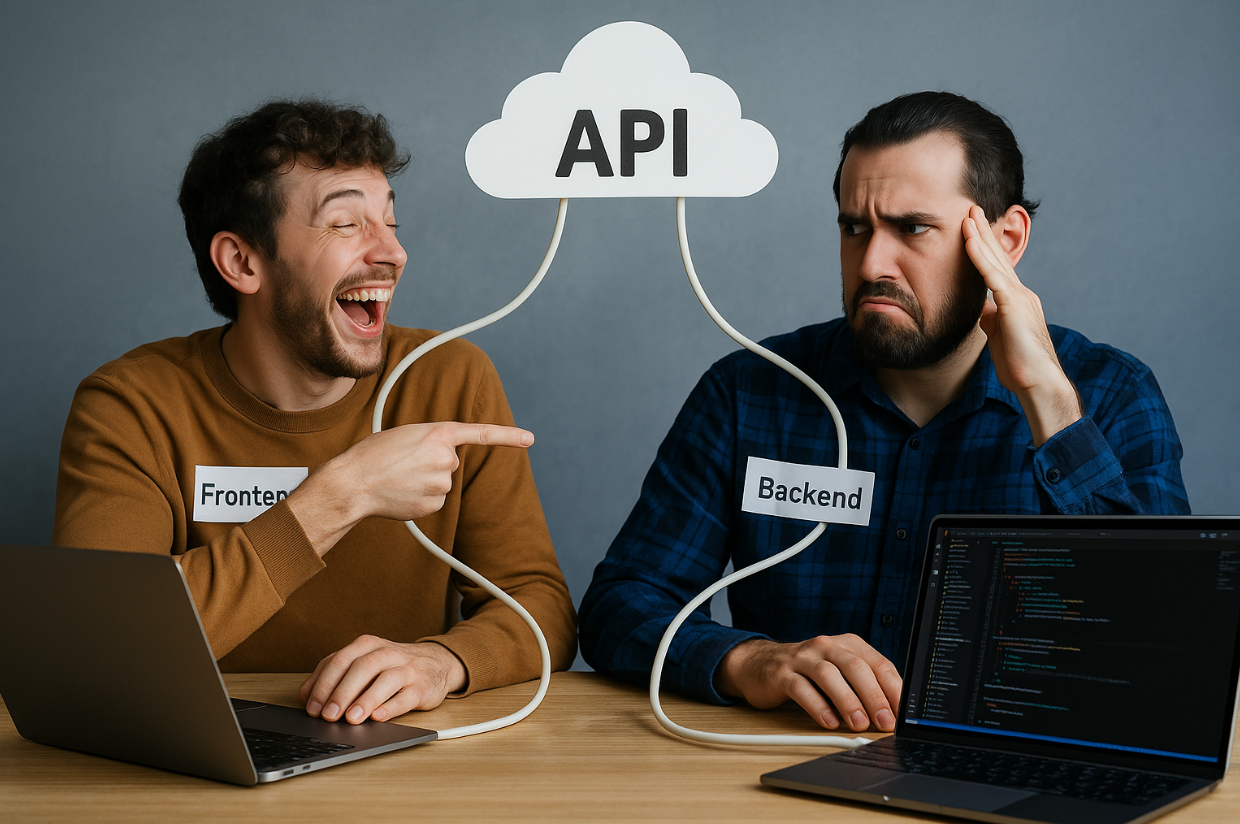APIs: The Love Language of Frontend and Backend Devs
Author: Kristoffer Dave Tabong | July 21, 2025

A mildly chaotic, brutally honest guide to the silent MVP of modern apps.
APIs are the reason your app doesn’t fall apart every time frontend and backend devs interact. They’re not just technical tools; they’re the fragile treaty keeping both sides from total collapse. Think of them as magic portals, but with more JSON and fewer dragons. If you’ve ever yelled at a fetch request, cursed at CORS, or copy-pasted from Stripe’s docs with trembling hands, this one’s for you.
- APIs Are Like Magic Portals, Minus the Dragons
APIs are the unsung heroes of software development. While frontend developers clamor for user data and backend developers guard their endpoints with quiet suspicion, the API stands in the middle—delivering information, maintaining order, and asking for nothing in return. They act as silent messengers and peacekeepers, translating technical requests into actionable outcomes. Without them, the conversation between frontend and backend would collapse into chaos.
- Without APIs, Frontend Is Just Pretty Pictures
A sleek, beautifully designed interface means nothing without functionality. Take an e-commerce site, for example. You can have the most elegant UI with perfectly placed buttons, but if clicking “Add to Cart” doesn’t trigger any action, it's just decoration. APIs are what give these elements life; linking visuals to logic, connecting users to actual transactions. Without APIs, there’s no interaction, just static mockups.
- Backend Devs Love APIs Because They Hate Explaining Things
For backend developers, APIs are the ultimate tool for avoiding long-winded explanations. Instead of walking frontend devs through how a system works, they simply hand over the Swagger documentation and let the endpoints speak for themselves. The frontend team takes it from there, calling endpoints, handling responses, and hoping for that sweet 200 OK. APIs handle the actual communication, the error handling, and the chaos in between. It’s not about talking, it’s about delegation.
- APIs Save You from OAuth Hell
Clicking “Sign in with Google” feels effortless, but under the hood lies a complex tangle of authorization tokens, scopes, and silent failures waiting to pounce. Fortunately, APIs abstract that pain. They manage the handshakes, the redirects, and the token exchanges behind the scenes. What looks like a simple login button is actually the front door to a secure identity system, handled entirely by the API so you don’t have to wade through the madness yourself.
- They Make You Look Smarter Than You Are
Integrating third-party services has never been easier, thanks to APIs. A developer might say they added payment processing in a night, but what they really did was copy a few lines from Stripe’s quickstart guide and hope for the best. APIs turn that kind of shortcut into real functionality, making even rushed work look polished and professional. They give developers superpowers without requiring deep magic.
- Backend Devs Use APIs to Dodge UI Complaints
When frontend developers point out visual glitches or layout issues, backend developers often deflect. “Talk to the designers,“ they say, absolving themselves of UI responsibility. But when the frontend team points to incorrect data, the backend’s response is simple: “The API is returning what it should.” APIs become the dividing line—a completed task, a closed ticket, a shield against further questions.
- API Fails Will Humble You Instantly
APIs may be powerful, but when they break, they remind you just how fragile the system really is. One minute everything works in Postman, and the next you’re staring at null values in the browser, lost in a maze of asynchronous calls, timeouts, and unfulfilled promises. APIs don’t just expose endpoints, they expose your assumptions. When they fail, they fail loudly.
- Without APIs, We’d Still Be Emailing CSVs
Before APIs, systems didn’t talk to each other. People did. And they did it with spreadsheets—emailed back and forth, renamed into oblivion, and inevitably out of sync. APIs put an end to that. They allow systems to communicate in real-time, automatically, and without the human error that came with the old ways. The age of manual data transfer is behind us, and good riddance.
- Every Dev’s Secret Hope: Good Documentation
No matter how powerful the API, it’s only as useful as its documentation. Swagger files, Postman collections, and clearly written ReadMe pages can make or break a project. When the docs are solid, developers move fast and with confidence. But when they’re missing or worse, outdated, you’re left poking at endpoints, guessing parameters, and crying into your terminal. Every dev lives in hope that the next API they use is well-documented.
APIs are the quiet backbone of software development. They connect the people who build interfaces with the people who build systems. They save time, prevent fights, and power nearly every interaction users take for granted. When they work, no one notices. When they break, everyone suffers. They’re not flashy, but they’re essential, and the entire dev world runs a little smoother because they exist.
Contact Us
Get in Touch
Feel free to reach out if you have any questions or concerns. We're happy to help!

